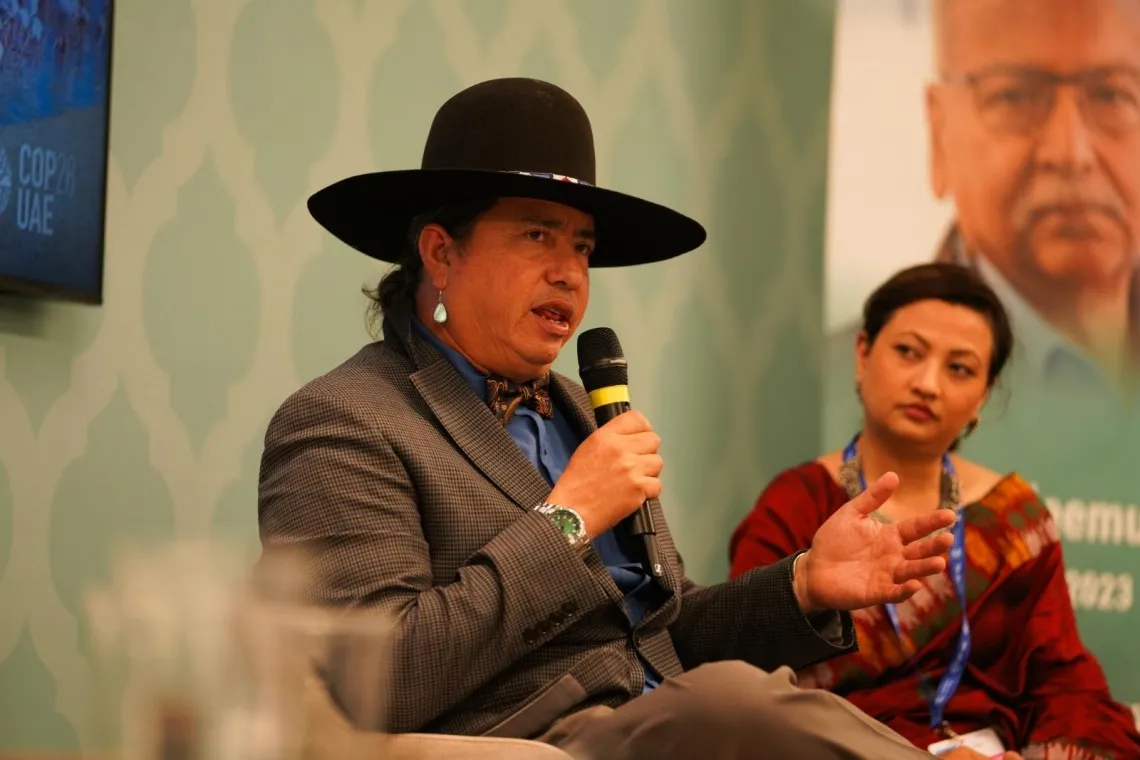Elevating Indigenous Knowledge at COP28

Dr. Michael Kotutwa Johnson of AIR's Indigenous Resilience Center presented at COP28 in Dubai.
COP28
The 2023 United Nations Climate Change Conference took place in Dubai in the United Arab Emirates, from November 30 through December 12, and hosted more then 70,000 delegates from all over the world, including state representatives, business leaders, young people, climate scientists, Indigenous Peoples, journalists, and various other experts and stakeholders.
The Arizona Initiative for Resilience and International Development and the Center for Climate Adaptation Science and Solutions within the Arizona Institute for Resilience, or AIR, brought together multidisciplinary experts from across the University of Arizona, and scholars from the Global South who are a part of the Climate Adaptation Research Program, to address and advance solutions towards a more resilient future. Learn about the UArizona delegation here.
Ten candidates were selected to attend the COP28 conference, including Michael Kotutwa Johnson, a core faculty member of the UArizona Indigenous Resilience Center (IRes). IRes' mission is to center Indigenous ways of knowing into co-designed environmental solutions and to train the next generation of community leaders. IRes sees a world in which Indigenous communities are thriving and adaptable to meet environmental and societal challenges.
Also known as the 28th Conference of the Parties, or COP28, the conference is the world’s only multilateral decision-making forum on climate change with almost complete membership of every country in the world. COP conferences are where the world comes together to agree on ways to address the climate crisis, such as limiting global temperature rise to 1.5 degrees Celsius, helping vulnerable communities adapt to the effects of climate change, and achieving net-zero emissions by 2050.
This year COP28 focused on four paradigm shifts:
- Fast-tracking the energy transition and slashing emissions before 2030
- Transforming climate finance by setting the framework for a new deal on finance
- Putting nature, people, lives, and livelihoods at the heart of climate action
- Mobilizing for the most inclusive COP ever
Johnson was a presenter at two panels on Day 10 at COP28, “Rising to the Challenge: Bridging Water and Food Policies, Practices and Financing for Sustainable Food System Transformation” and “Regenerative and Nature-Positive Agriculture," at which he shared his research and the traditional dry-land farming practices and place-adapted crops that have fed the Hopi people for thousands of years. He emphasized that what makes traditional food systems so resilient is not the crops themselves or specific farming technologies, but the belief systems that have supported them for millennia.
“Nature gives you everything you need to have," Johnson said.
When asked about his overall impressions of the COP28 conference, Johnson responded: “Even though Indigenous people were present at COP28, our values and our relationship we have with Nature are still secondary to economic interests of those who control the global food system. However,” he added, “despite the lack of recognition based on our ways of knowing and our relationship with Nature, the Indigenous people will continue to be resilient as we have been since time immemorial.”
Located within AIR and supported by the Agnese Nelms Haury Program in Environment and Social Justice, IRes works on areas of tribal food, energy, and water systems. The Center identifies and looks for resources to support co-designing solutions with Indigenous communities.
A version of this story was originally published by UArizona's Native American Advancement, Initiatives and Research unit.

